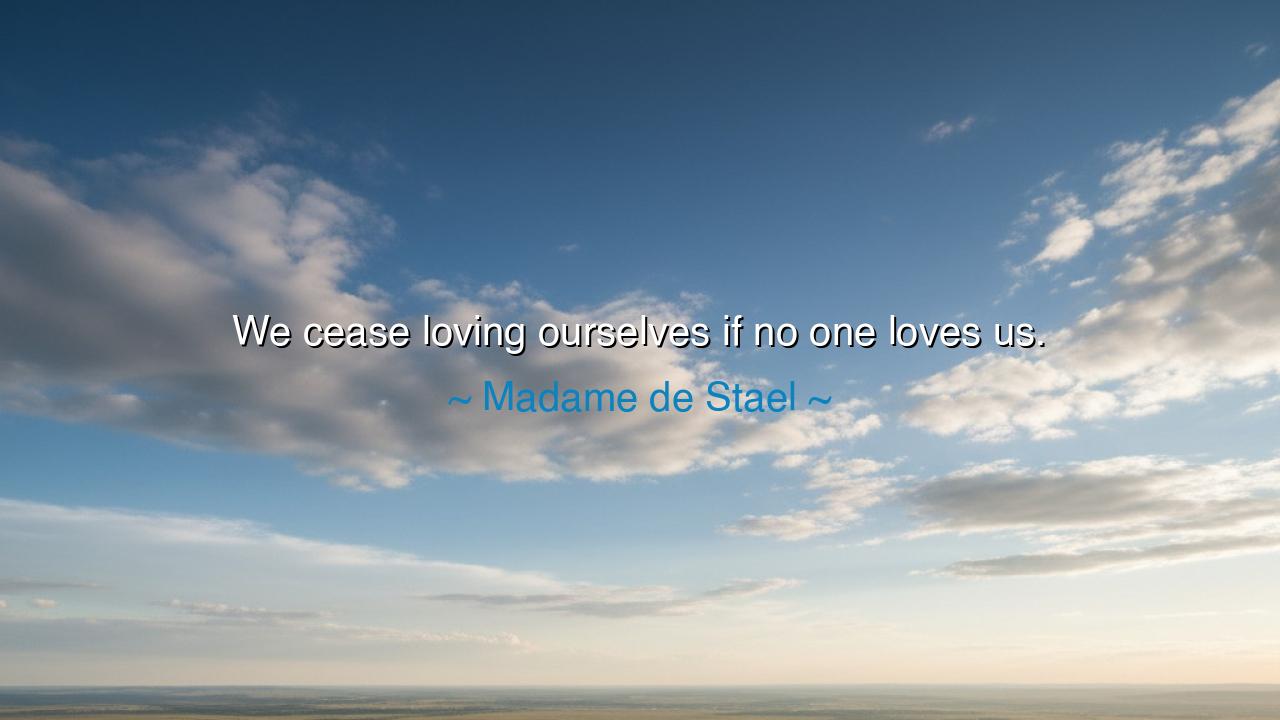
We cease loving ourselves if no one loves us.






“We cease loving ourselves if no one loves us.” — Madame de Staël
These words, born from the heart of Madame de Staël, a woman of intellect and passion in the age of revolution, carry the quiet sorrow of truth and the grandeur of wisdom. In them, she unveils the fragile mirror of the human soul — that our love for ourselves does not exist in isolation, but is reflected and sustained by the love we receive from others. The self, though noble and divine, is easily dimmed when it finds no light of affection shining upon it. Without love, even the strongest spirit begins to doubt its own worth.
From the dawn of mankind, people have drawn strength not merely from their inner will, but from the recognition of others. When a child is held in a mother’s arms, it learns not only that it is loved, but that it is worthy of love. That sacred assurance becomes the foundation of the soul’s strength. But if that affection is withheld — if no warmth meets the yearning heart — then self-love wanes like a flame denied air. Madame de Staël understood this, for she lived in exile, separated from her beloved France, shunned by those who once praised her. In her solitude, she felt the slow erosion of her inner light, and thus she spoke this truth: that the heart cannot love itself when it has been too long unloved.
Consider the life of Vincent van Gogh, the painter of stars and sorrow. He poured his soul onto the canvas, yet in life he was met with rejection and misunderstanding. Few bought his art; fewer still offered kindness. His genius burned bright, but his heart was starved. And in that desolate silence, he began to lose faith in himself. The man who painted the heavens could no longer see his own light. When love was denied him, he ceased to love himself — and so the world lost him too soon.
It is not vanity to desire love; it is nature. Just as the earth needs sunlight to bring forth its flowers, so too does the spirit need affection to blossom. Love from others serves as the mirror of self-worth, reflecting back to us the image of who we are. When no one cherishes us, we begin to question that image — “Am I worthy? Am I seen?” Thus, Madame de Staël reminds us that to love others is not merely charity, but salvation. Each act of love we give may rekindle a dying flame in another’s heart.
Yet, there is also strength in knowing that self-love must not wholly depend on others. Though we need love to awaken it, once kindled, it must be guarded like a sacred fire. When the world grows cold, we must remember the love we have received — even if it be from a single soul — and let it sustain us. To cease loving ourselves is to abandon the temple of our own spirit. We must refuse such surrender.
So, what lesson lies within these words for those who live today, in an age where many feel unseen? It is this: become both the giver and receiver of love. When you see someone fading in spirit, offer them kindness — not pity, but presence. Tell them they matter. Look upon them with sincerity. For in doing so, you help them remember their worth, and by that same light, you strengthen your own.
Finally, to you who read this: do not let the world’s neglect make you an enemy to yourself. When others cannot love you, love yourself more fiercely. Seek out those whose hearts are warm, and be warmth to others. For in the exchange of love — both given and received — the human soul rediscovers its immortality. Let this be the eternal wisdom of Madame de Staël’s words: that to keep loving ourselves, we must live in the circle of love — sharing it, seeking it, and never letting it die.






AAdministratorAdministrator
Welcome, honored guests. Please leave a comment, we will respond soon